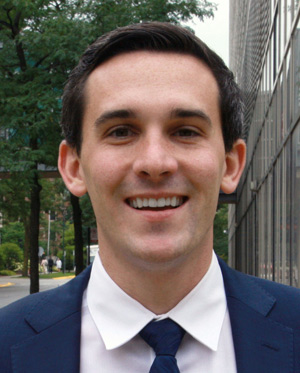 Robert Martin
Robert Martin
Assistant Director, Supply Chain Project Management
UChicago Medicine, Chicago, Illinois
About Robert Martin:
Robert Martin likes to build things. That’s why he enjoys being right in the middle of the transformation of UChicago Medicine from an academic medical center in Hyde Park, to a health system including lower-acuity inpatient and outpatient facilities throughout Chicago.
Born and raised in Chicago, Martin graduated with a general engineering degree from the University of Illinois at Champaign-Urbana. A degree in general engineering is similar to one in industrial engineering in that both are concerned with building and improving processes for complex systems and organizations, he explains. After graduation, he worked for three years for Danaher Corporation, as a commodity manager. “I spent a number of years doing manufacturing engineering, and fulfilling supply chain roles,” he says. “I learned to love the marriage of supply and business.”
In November 2015 he joined UChicago Medicine as process transformation specialist. Less than a year later, UChicago acquired Ingalls Memorial Hospital, a general medical/surgical hospital in a southern suburb. Martin became manager of supply chain process transformation, and in 2017, assumed his current role in supply chain project management. “I am in charge of our strategy and execution for the entire non-acute supply chain, including our outpatient center in Hyde Park and our ambulatory care network in surrounding communities,” including facilities in the southern suburbs as well as Chicago’s South Loop, he says. He also works with the system’s affiliate program, in which it shares supply chain services and expertise with other Chicago-area facilities, such as the Shirley Ryan AbilityLab and La Rabida Children’s Hospital.
“Today, we are up to about 40 sites. Whereas at first, we spent refining the way we got these sites up and running, today, we have that process pretty well-tuned, so that we can focus on how to leverage this larger network.
“It’s been great,” he says. “The environment is dynamic, and the attitude is, ‘We want to learn and grow, try new things and see what works.’ The dynamic nature of the healthcare industry combined with the real impact I’m able to have on our patients has been a major draw for me.”
About UChicago Medicine:
The University of Chicago Medicine unites the missions of the University of Chicago Medical Center, Pritzker School of Medicine and the Biological Sciences Division. UChicago Medicine offers a full range of specialty-care services for adults and children through more than 40 institutes and centers, including an NCI-designated Comprehensive Cancer Center. Together with Harvey-based Ingalls Memorial, UChicago Medicine has 1,286 licensed beds, nearly 1,300 attending physicians, about 3,200 nurses and over 1,100 residents and fellows.
Most interesting/challenging project in past 12-18 months:
“In 2016, UChicago Medicine acquired Ingalls Memorial Hospital, which has several large ambulatory/outpatient facilities within their network,” he says. “I was able to develop the strategy for how supply chain will continue to grow and optimize with our expanding ambulatory network, which up until that point had been largely focused on building new facilities. The Ingalls acquisition presented an exciting new challenge to implement our processes in an existing infrastructure while also having to change the culture and mindset towards supply chain. I enjoyed being able to work with the clinical end users to help deliver solutions for them that enhanced their work and the lives of our patients.”
Looking forward to:
“UChicago Medicine continues to grow at a rapid pace as we expand our care coverage into the surrounding communities,” he says. “This brings exciting new opportunities for our supply chain group as we strategize how to expand our team and services to accommodate new sites while also leveraging our economies of scale to be more efficient and cost-effective.”
Biggest challenge/change facing healthcare supply chain professionals in the next 5 years:
“As hospital systems continue to face challenges with reimbursement and pricing, supply chain will be counted on even more to deliver cost-saving opportunities,” says Martin. “Additionally, as medical advancements continue to progress, personalized medicine and individual treatment plans will become more prevalent, which increases the complexity of the supply chain and could dilute the ability to leverage bundled opportunities, economies of scale and standardization. This will generate continued pressure for supply chain groups to streamline workflows and take advantage of economies of scale as the provider marketplace consolidates. New entrants such as Amazon and Walmart will likely play a key role in helping shape the landscape for how healthcare supply chain operates in the future.”
